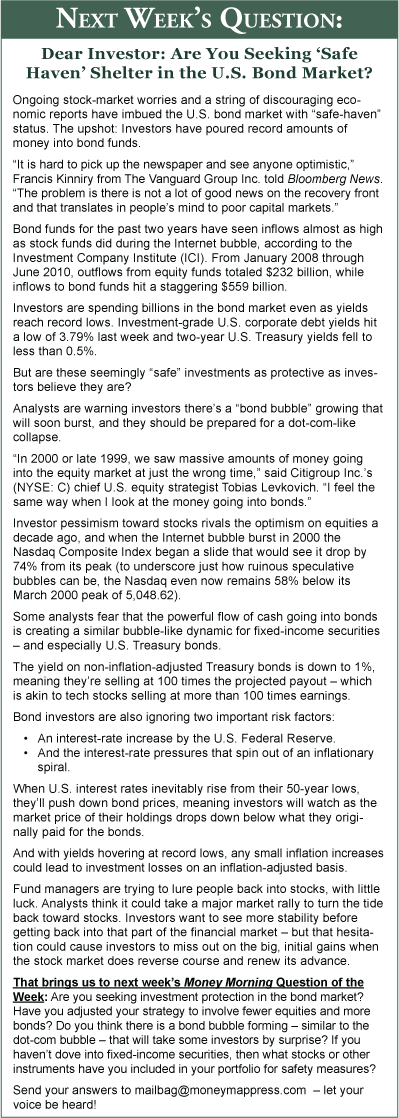The U.S. Federal Reserve last week said it would take a small "easing" step - what Fed watchers described as a largely symbolic move designed to show the central bank is "concerned" with the nation's economic outlook. The central bank's policymaking Federal Open Market Committee (FOMC) said it would hold interest rates at record-low levels and announced it would reinvest maturing mortgage-backed securities back into the market so that its balance sheet does not shrink.
However, Analysts think the Fed will have to do more to help the economy move along, and are expecting more announcements of policy easing in coming weeks.
"I suspect that the Fed will, within time, purchase more longer-dated government securities" than is required by reinvesting the principal payments from agency debt and agency mortgage-backed securities in the Fed's portfolio, said veteran Wall Street economist Henry Kaufman to Reuters.
But the Fed remains divided on how to proceed with its policy decisions, with some voting to attack problems more aggressively, and others suggesting that small, fine-tuning measures are better.

This prompted our previous installment of Money Morning Question of the Week: Do you think the Fed has done a good job during this crisis? Has it done enough? Too much? Too little? What else would you wish to see?
Here is a collection of reader responses highlighting frustration with the Fed's policies during the financial crisis aftermath.
Inflation, Deflation…It All Falls Down
Ever since Paul Volcker left as chairman, the Fed has been focused on preventing or minimizing downturns in the economy. The first president [George H.W.] Bush blamed the Fed policies for losing his re-election bid back in 1992, and they have come to see any little declines in the economy as failures of their policies. Thus, in the '90s to keep things humming along they inflated the dot-com bubble, and after the downturn at the beginning of this decade, they dropped interest rates to 1.0% and inflated the housing bubble. When the housing bubble burst they dropped rates to 0.0% and added over $1 trillion to the money supply, probably inflating a banking and Treasuries bubble.
However, by focusing always on the near-term minor stuff, they have allowed long-term, major imbalances to develop, which they are still trying to adjust for on a short-term basis. The idea of applying a Volcker remedy to the economy, by allowing rates to rise, bankruptcies to occur, and large amounts of debt to liquidate, is seen by Fed chairman Ben Bernanke and the Fed governors as a potential catastrophe. At the same time, they have developed a situation where rising rates, bankruptcies, and debt liquidation are inevitably going to happen, regardless of how much they fight them.
Ideally, the Fed would like to have an inflation rate of 5-6%, but I think that this is no longer a possibility. We are either going to see deflation as the needed liquidation occurs, or if they manage to generate inflation it will be sudden and catastrophic - probably at more than 100% - as people suddenly panic and try to exchange what dollars they have for any tangible goods.
Or probably, deflation first for an indefinite period of time, and then sudden inflation as the Fed's efforts combine with other circumstances to create a burst of hyperinflation some time down the road.
We desperately need to liquidate the mistakes that have been made, but to do so would cause the collapse of many [or all?] of the large banks, and as the banks are the real constituency of the Fed, rather than the American public, they will continue to fight to keep the banks alive and paying bonuses, until everything collapses regardless of their efforts.
- Gordon F.

Fueling a Destructive Fire
They are adding to the financial crisis. I keep hearing about the worries that there is going to be deflation. I look at my personal situation and the situation of many I know and wonder what they are talking about.
It used to be (about 30 years ago) that anyone with a decent job could buy a home for about a quarter of their monthly income. Who can do that now? The Fed has created out of thin air much more money than has ever existed before. Based on what? Nothing! This has and will continue to cause prices to rise. Especially with all the overspending that politicians do. [U.S. President Barack] Obama and Congress add to the problem by extending unemployment benefits seemingly endlessly (talk about a disincentive to produce).
Please encourage work and go back to the gold standard. The government needs to get right of the Fed and only spend what it takes in.
- Tom C.
Too Much Meddling
For all of its meddling, the Fed may end up with the worst of all worlds, an inflationary depression much like the Weimar Republic of post-WWI Germany: high unemployment and a wheel barrel full of money to buy a loaf of bread, or in present day a "Made in China" article.
Go back to the history books Mr. Bernanke.
- Bob
Headed for Hyperinflation
Printing more money and putting it into the system does not solve the problem of unemployment or putting the country out of recession. If the present trend continues then a deep recession is coming with hyperinflation, where you will find people running here and there needing more money in hand to fill up their empty stomachs and fulfill needs. Currency value will decrease and no country will have the power to bring its currency value up.
Gold can shine brightly for little periods but you cannot eat gold…
- Shailesh A.
Just Give The Money to the People
So if the Fed is serious about helping the economy, instead of giving banks money at
0.0% interest, why not issue 3.0% mortgages directly to the public (a.k.a., the voters)?
Many would refinance, thereby freeing cash to spend on the recovery.
- Bernard L.
[Editor's Note: Thanks to all who responded to last week's "Question of the Week" feature regarding the Fed's policy making. Be sure to answer next week's question:
Send your answers to [email protected]!
Is there a topic you want to see covered as a Question of the Week feature? Then let us know by e-mailing Money Morning at [email protected]. Make sure to reference "question of the week suggestion" in the subject line. We reserve the right to edit responses for length, grammar and clarity.
Thanks to everyone who took the time to participate - via e-mail or by posting their comments directly on the Money Morning Web site.]
News and Related Story Links:
- The Wall Street Journal:
Fed Split on Move to Bolster Sluggish Economy - Reuters:
Fed to take more policy easing steps: Kaufman - Money Morning News Archive:
Volcker Plan Stories - Money Morning News Archive:
Question of the Week Feature


